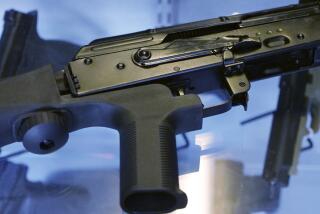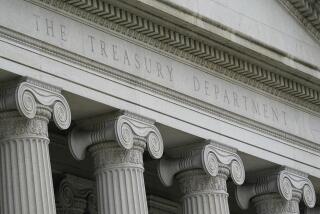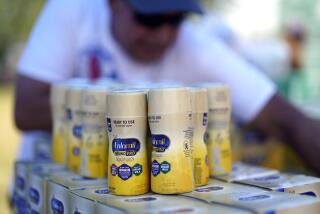Fertilizer law seen as weak on security
More than 12 years after Timothy J. McVeigh used ammonium nitrate fertilizer to blow up the Oklahoma City federal building, Congress quietly passed legislation this month to regulate sales of the explosive.
But the Secure Handling of Ammonium Nitrate Act of 2007, part of an appropriations measure signed Wednesday by President Bush, falls far short of the strict law that some in the counter-terrorism community and federal law enforcement were hoping for.
“The bill really does not guarantee anything for the security of the citizens of the United States,” said Bill Albright, a Defense Department consultant who spent his career at what is now known as the Bureau of Alcohol, Tobacco, Firearms and Explosives, or ATF.
The law, which the fertilizer industry supported, leaves the U.S. with weaker controls on ammonium nitrate than Britain, Germany, Australia, Israel, Saudi Arabia and many other nations.
Ammonium nitrate has been used in terrorist bombings around the world, including the attacks on U.S. embassies in Tanzania and Kenya in 1998.
Because of last-minute revisions to the legislation, many federal officials and outside experts -- and even some members of Congress -- are uncertain exactly what it mandates.
The Department of Homeland Security “is still reviewing the new law and considering how to harmonize it with existing chemical facility rules,” an agency spokeswoman said Saturday.
The measure requires licensing for ammonium nitrate facilities, registration for purchasers, and a framework for establishing what forms of ammonium nitrate will be regulated -- but leaves the specifics up to bureaucrats to decide later.
Clamping down on ammonium nitrate has taken years longer than it did to tighten controls on other explosives, nuclear materials, airport security and a range of other potential security weaknesses.
About 8 billion pounds of ammonium nitrate is used in the U.S. annually, split about evenly between the agriculture and explosives industries, according to business and government figures.
Which forms of ammonium nitrate to regulate has been a sticking point. ATF and Defense Department officials have pushed for stricter rules on any potentially explosive blends of fertilizer, seeking to require that buyers show a state-issued driver’s license, among other measures.
The main sponsor of the bill was House Homeland Security Committee Chairman Bennie Thompson (D-Miss.). Mississippi is one of the nation’s largest producers of ammonium nitrate, according to the Fertilizer Institute, a trade group based in Washington.
“This bill will allow the Department of Homeland Security to regulate the sale and purchase of ammonium nitrate in order to keep it out of the hands of terrorists while allowing it to be continually available for agriculture use,” said Thompson, whose panel has jurisdiction over the department.
In October, the House passed a version of Thompson’s bill that would have controlled sales of ammonium nitrate fertilizer containing 33% or more nitrogen -- and left it to the secretary of the Department of Homeland Security to set lower limits.
In the last-minute revisions, however, the 33% threshold was removed from the bill and the decision of what to regulate was left entirely to the Department of Homeland Security.
Tests conducted by the Defense Department since the Oklahoma City bombing have demonstrated that the fertilizer can blow up with as little as 10% to 25% nitrogen content, according to ATF and defense officials.
In one test, a hopper car full of fertilizer yielded an explosion equal to 20,000 pounds of TNT, a senior Defense official said. That is about the equivalent of the largest conventional ordnance in the Pentagon’s arsenal, and four times the estimated size of the Oklahoma City blast.
Detonating ammonium nitrate requires a booster, such as widely available special gunpowder or harder-to-get plastic explosives.
Mixing fuel oil with ammonium nitrate is sometimes done to improve its explosive power but is not necessary.
The Fertilizer Institute asserts that there is no public evidence that fertilizer with a concentration of nitrogen lower than 34% can be easily detonated. “I would like to see the data on that,” said Kathy Mathers, its vice president for public affairs. “ATF has refused to share the testing data.”
An ATF spokeswoman said Friday that she had no information on the issue and she could find no official available to respond.
At least some of the test data have been classified by the Defense Department. But current and former ATF officials -- who spoke with the Los Angeles Times on condition of anonymity because they were not authorized to discuss the matter publicly -- said Pentagon tests showed conclusively that lower concentrations could detonate, and that videos of those tests were shown to the Fertilizer Institute staff.
Critics of the ammonium nitrate act also say the legislation splits jurisdiction over explosives between Homeland Security and the ATF.
After the Sept. 11, 2001, terrorist attacks, the ATF was given responsibility for tight new regulations on explosives such as TNT and dynamite under the Safe Explosives Act of 2002.
“We have made policy recommendations that ammonium nitrate be regulated by ATF, so as not to create one more agency with jurisdiction,” said Jeffrey L. Dean, executive director of the International Society of Explosives Engineers, a technical group based in Cleveland.
“The more agencies that get involved, the more confusion that exists, and the more confusion that exists, the less safety we have.”
The explosives industry has worked closely with the ATF to improve domestic control of explosives, Dean said, a system that was difficult to implement but is now working well. Currently, federal licenses are required to purchase dynamite and TNT, as well as some prepared blends of ammonium nitrate and fuel oil, but not raw ammonium nitrate.
Outside groups are asking for tougher action. “Congress simply didn’t understand what it was doing,” said Peter Stockton, senior investigator for one of the groups, the Project on Government Oversight, which is a watchdog on national security issues.
“Maybe they thought doing something was better than nothing.”
--
More to Read
Sign up for Essential California
The most important California stories and recommendations in your inbox every morning.
You may occasionally receive promotional content from the Los Angeles Times.











